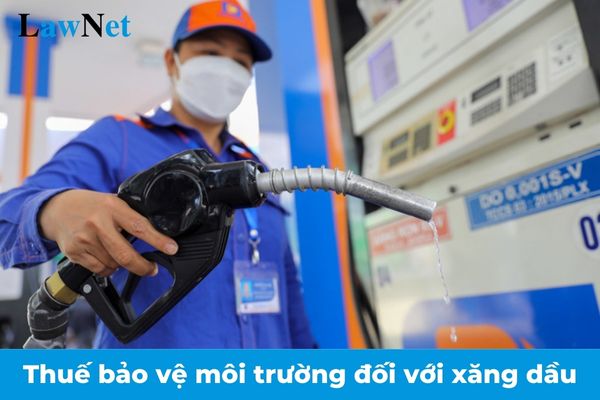What are regulations on environmental protection tax rates applied to gasoline and oil in Vietnam from January 1, 2025?
What are regulations on environmental protection tax rates applied to gasoline and oil in Vietnam from January 1, 2025?
Pursuant to Clause 2, Article 1 of Resolution 42/2023/UBTVQH15, which stipulates the environmental protection tax rates applied to gasoline, oil, lubricant and grease products as follows:
environmental protection tax rates applied to gasoline, oil, lubricant and grease products
...
- The environmental protection tax rates applied to gasoline, oil, lubricant and grease products from January 1, 2025, will continue to be implemented in accordance with Section I, Clause 1, Article 1 of Resolution No. 579/2018/UBTVQH14 dated September 26, 2018, of the Standing Committee of the National Assembly on the environmental protection tax Table.
Concurrently, in accordance with Section 1, Clause 1, Article 1 of Resolution 579/2018/UBTVQH14, which stipulates the environmental protection tax rates applied to gasoline, oil, lubricant and grease products.
Therefore, from January 1, 2025, the environmental protection tax rates applied to gasoline and oil are determined as follows:
(1) Gasoline, excluding ethanol: 4,000 VND/liter.
(2) Aviation fuel: 3,000 VND/liter.
(3) Diesel oil: 2,000 VND/liter.
(4) Kerosene: 1,000 VND/liter.
(5) Fuel oil: 2,000 VND/liter.
(6) Lubricating oil: 2,000 VND/liter.
(7) Lubricating grease: 2,000 VND/kg.

What are regulations on environmental protection tax rates applied to gasoline and oil in Vietnam from January 1, 2025? (Image from Internet)
How to declare and pay environmental protection tax for gasoline and oil in Vietnam?
Pursuant to Point 2.2, Clause 2, Article 7 of Circular 152/2011/TT-BTC, supplemented by Article 4 of Circular 159/2012/TT-BTC, the regulations on declaring and paying environmental protection tax for gasoline and oil are as follows:
Key petroleum business companies shall perform registration, declaration, and payment of environmental protection tax to the state budget at the local tax authority where value-added tax is declared and paid, specifically:
- Key petroleum business companies directly importing, producing, processing gasoline (referred to as key units) shall declare and pay tax at the location of the head office for the amount of gasoline these units directly dispatch, sell including dispatch for internal consumption, dispatch for exchange of other products, dispatch return of consignment imports, sell to other organizations and individuals outside the key unit system (including enterprises that the key unit holds shares up to 50%); excluding the amount of gasoline sold and consigned for import to other key petroleum business companies.
- Independent accounting member units affiliated to the key unit; Branches affiliated to the key unit; Joint-stock companies held by the key unit with more than 50% of shares or Branches under these member units, branches under these joint-stock companies (collectively referred to as member units) shall declare and pay tax at the location of the head office for the amount of gasoline the member units dispatch, sell to other organizations and individuals outside their system.
- Other organizations that directly import, produce, process gasoline shall declare and pay tax at the local tax authority where value-added tax is declared and paid upon dispatch, sale of gasoline.
- In cases where gasoline is used as raw material for biofuel blending and has not declared and paid environmental protection tax, upon selling biofuel, the biofuel selling unit must declare and pay environmental protection tax as prescribed.
- In cases where gasoline, oil, lubricant and grease products are imported for purposes other than for sale; lubricants and greases packaged separately when imported with materials, spare parts for aircraft, or with machinery and equipment, the taxpayer shall declare and pay environmental protection tax with the customs authority.
- Gasoline sold, dispatched as per the output recorded on invoices, dispatch documents necessitate that the taxpayer declares and pays environmental protection tax according to the output recorded on such invoices, dispatch documents.
Which entities are the taxpayers of environmental protection tax in Vietnam?
Pursuant to Article 3 of Circular 152/2011/TT-BTC, the regulations on who the taxpayers of environmental protection tax are as follows:
- Taxpayers of environmental protection tax include organizations, households, individuals producing, importing goods subject to tax as stipulated in Article 1 of Circular 152/2011/TT-BTC.
- Taxpayers of environmental protection tax in certain specific cases are stipulated as follows:
+ Entities authorized to import goods are liable for paying environmental protection tax, regardless of authorization form for importation and delivery of goods to the mandator or the authorized importation entity.
+ Organizations, households, individuals producing, processing, concurrently authorized to sell goods in the Vietnamese market are taxpayers of environmental protection tax. In cases where organizations, households, individuals process but are not authorized to sell goods, the entity engaging the processing is liable for environmental protection tax upon exporting, selling goods in Vietnam.
+ In cases where organizations, households, individuals are focal points for purchasing small-scale mined coal and cannot provide proof of environmental protection tax payment, the focal organizations, households, individuals are liable for tax.

